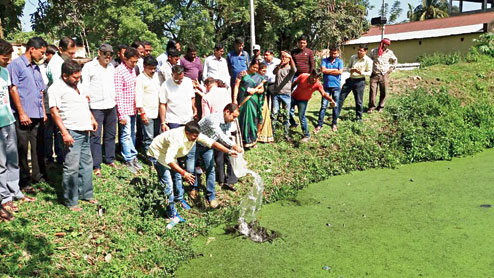
Raiganj: The release of guppy fish by the Raiganj municipality in waterbodies to curb dengue outbreak has made experts raise questions over the efficacy of the move that lacked any expert's opinion or study of water samples.
Guppy, a fresh water fish, feeds on mosquito larvae. It is an effective move to release the fish in water bodies to control mosquitoes, the vector that carries viruses which can cause dengue, malaria and some other diseases.
As several residents of Raiganj are suffering from suspected dengue, the municipality had held an emergency meeting early this week and decided to release guppy fish in water bodies to prevent the outbreak of the disease.
They approached the state fisheries department through the district administration and got some fish.
"We made the decision to curb the risk of dengue infection. The state fisheries department has provided us with 10,000 guppy fish. These would be released in 15 water bodies which are located across the town," Sandip Biswas, the civic chairman, had said.
The move has, however, left experts disappointed.
"It is disappointing that the civic body is not consulting experts before releasing the fish. We doubt whether the elected representatives are serious about curbing dengue or just doing it for eyewash," said an expert.
According to him, there is no chance that mosquito larvae can be found in every waterbody.
"They should have taken experts' opinion to identify places and should have tested water samples of ponds, ditches and other waterbodies. The decision to release guppy fish was appropriate but identification of places where mosquitoes release larvae can be found is equally important or else, the exercise would only prove futile, the expert added.
Tapas Kumar Choudhury, a former professor of zoology of North Bengal University, said Aedes Aegypti, the mosquito species that carries the dengue virus, lays larvae in wet, muddy or shabby area in a dark place and not in an open water body which gets sunlight.
"If proper locations are not identified, it would hardly help even if guppy is released in an indiscriminate manner," said Choudhury.











